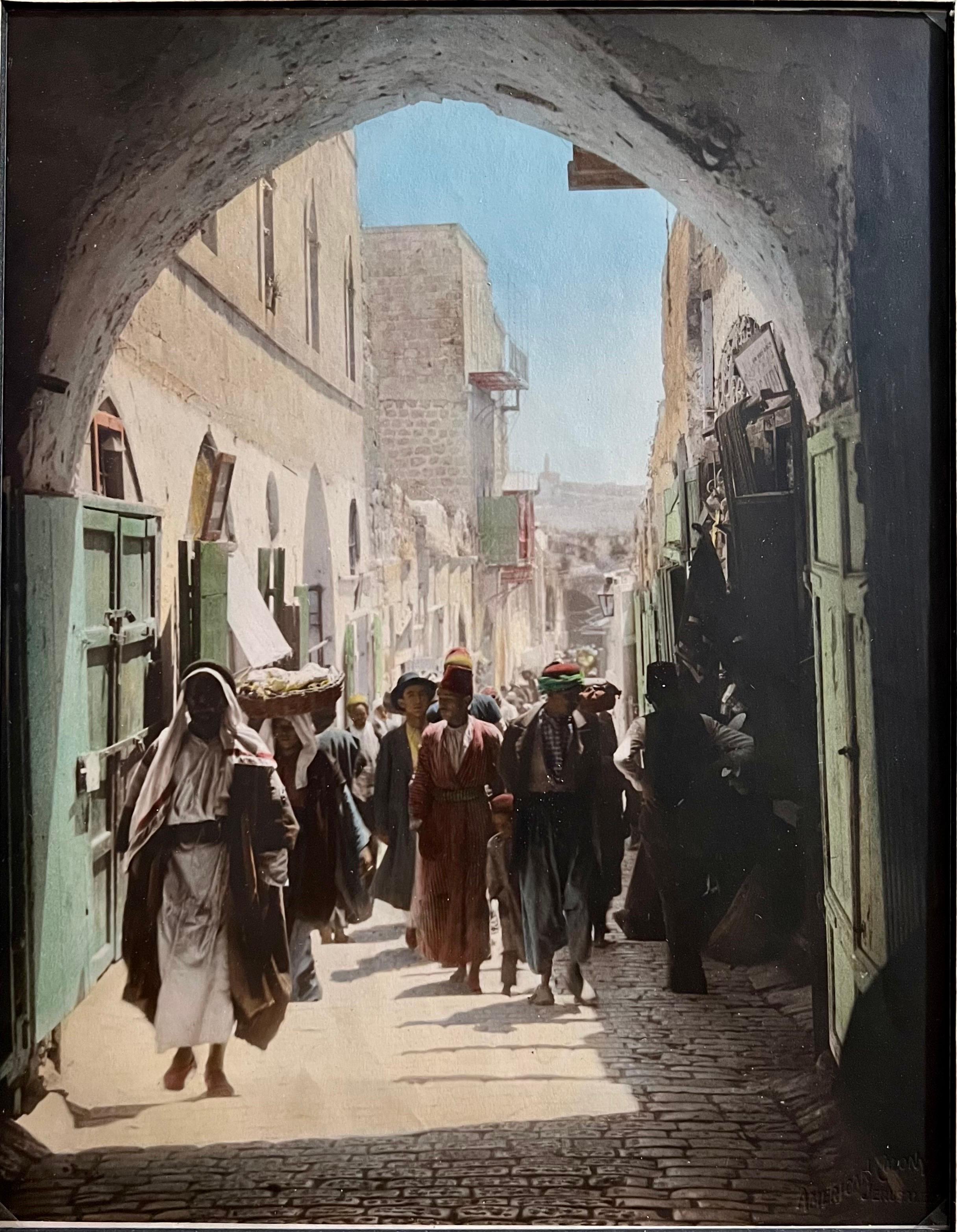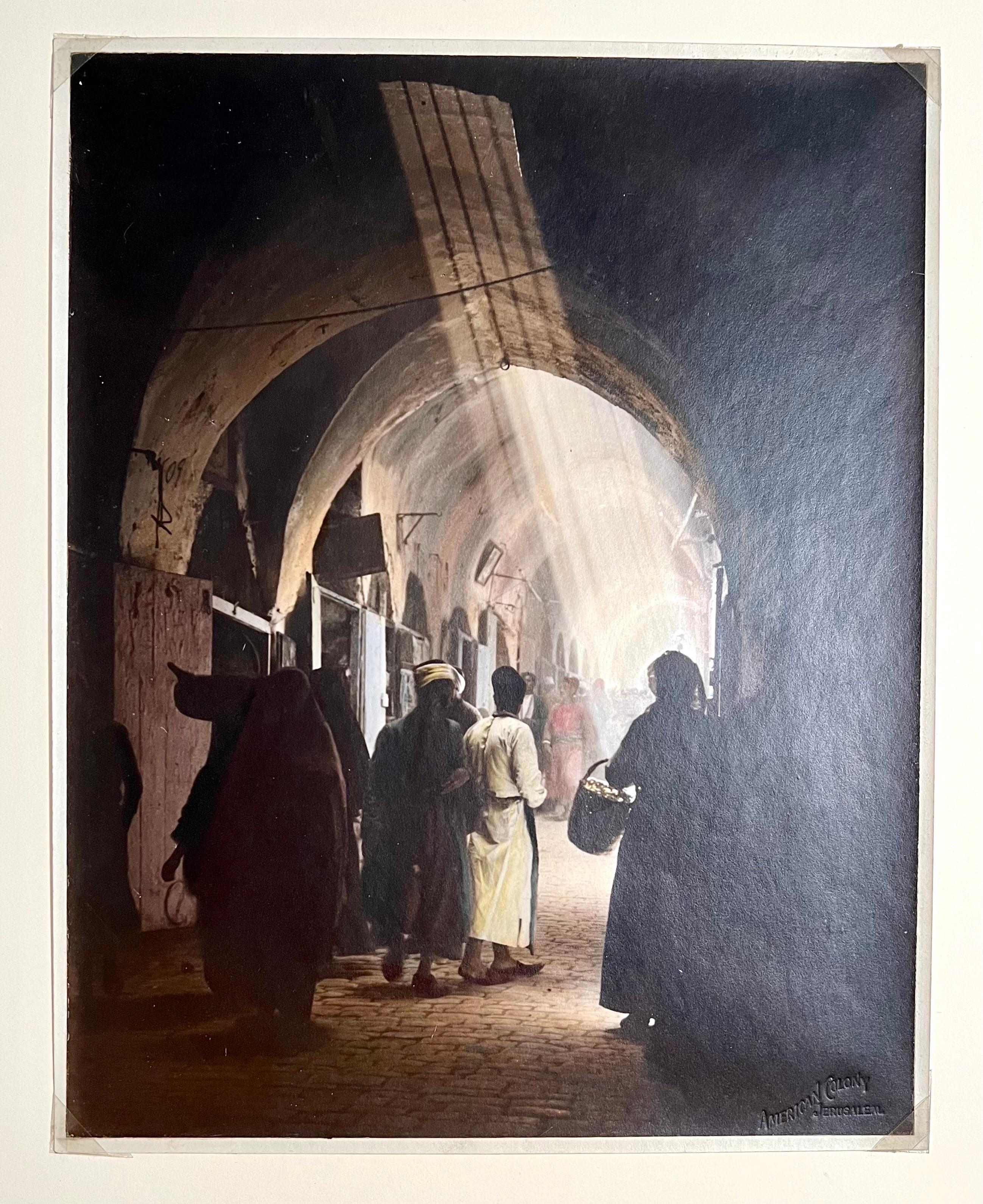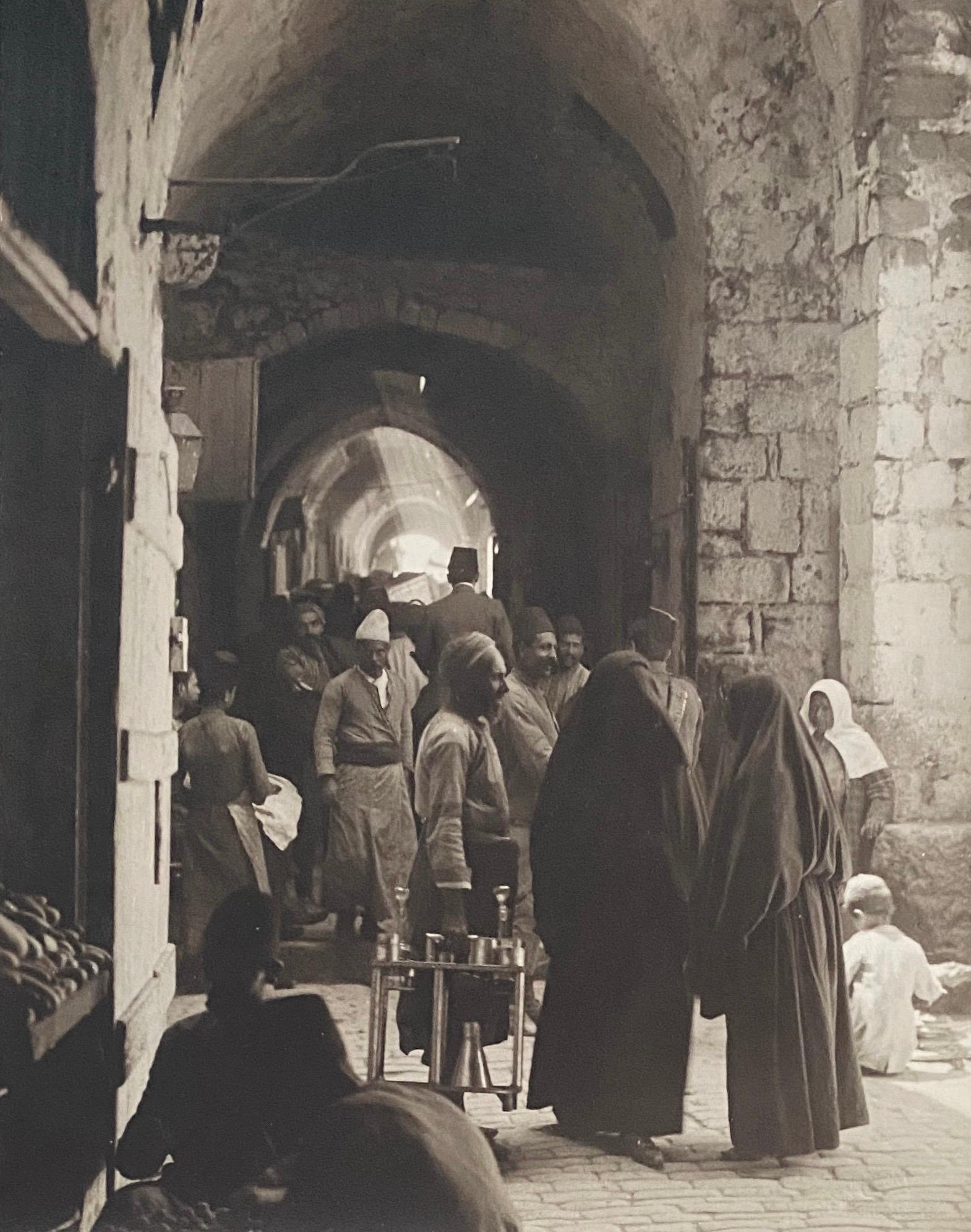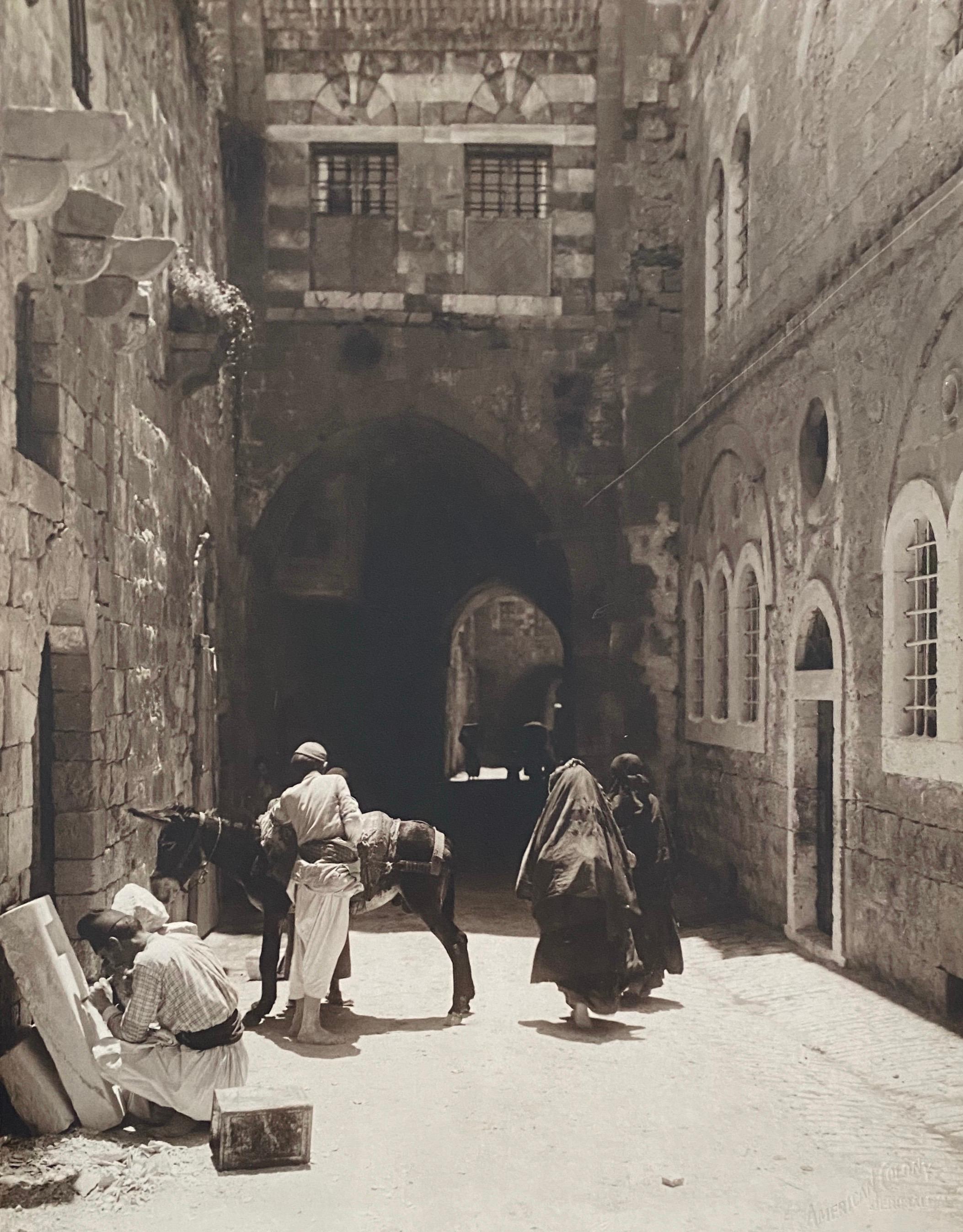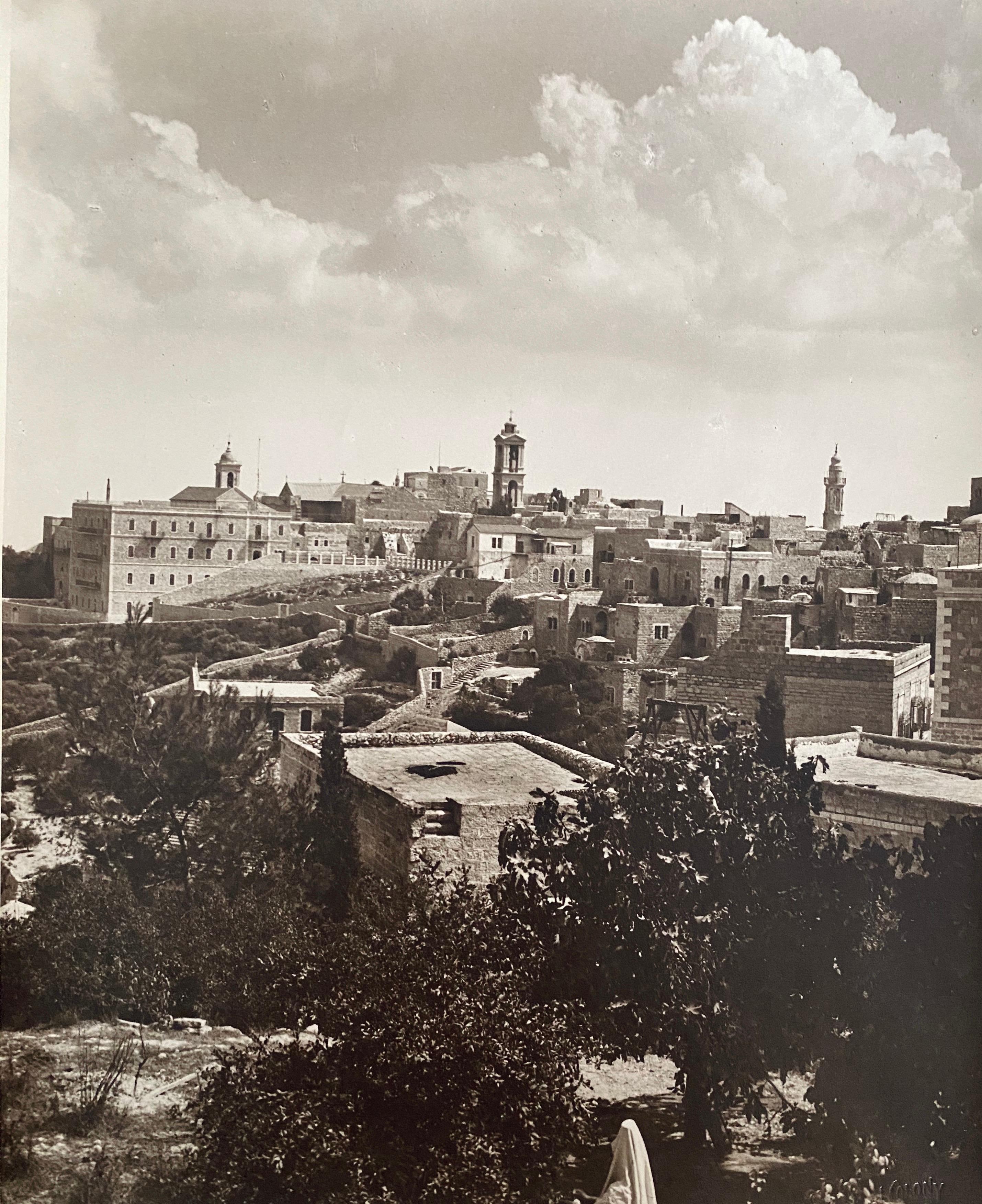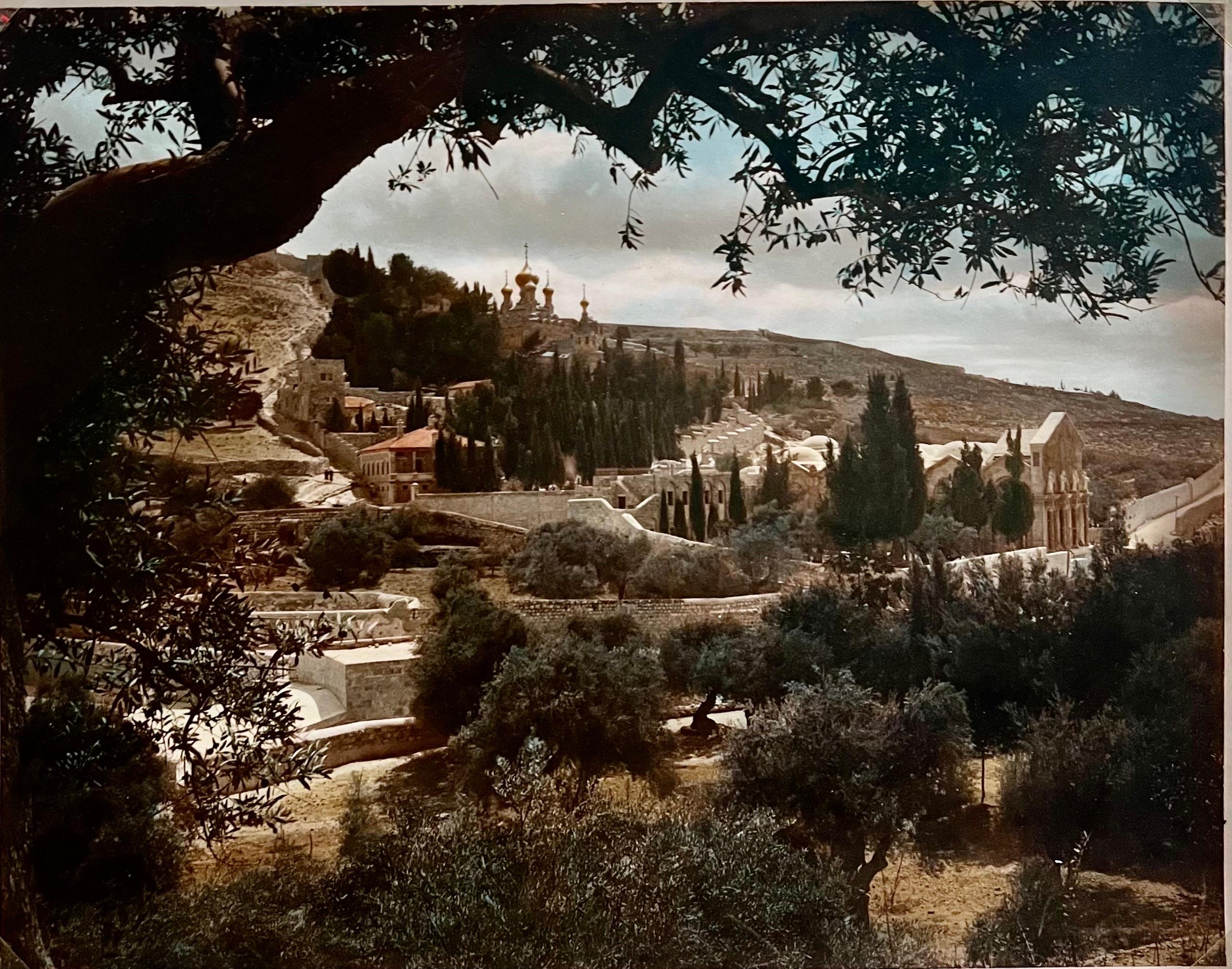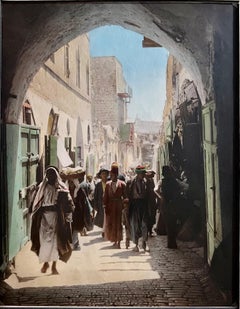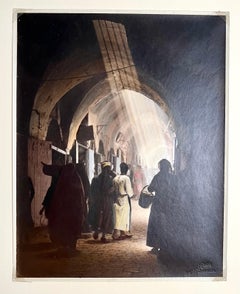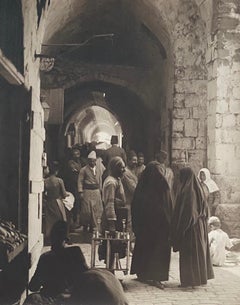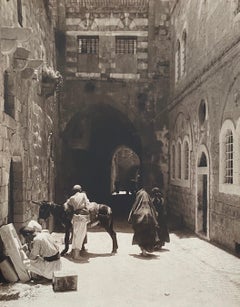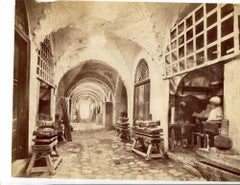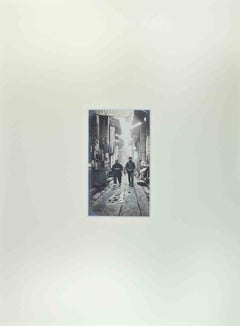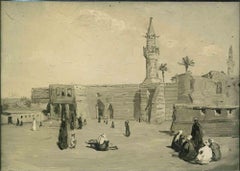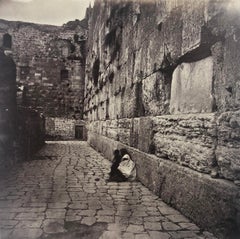Items Similar to Vintage Large Albumen Photo Jerusalem Photograph American Colony Old City Market
Want more images or videos?
Request additional images or videos from the seller
1 of 12
American Colony JerusalemVintage Large Albumen Photo Jerusalem Photograph American Colony Old City Market1890-1920
1890-1920
$800
£611.64
€704.49
CA$1,121.05
A$1,251.54
CHF 655.79
MX$15,320.10
NOK 8,328.53
SEK 7,852.74
DKK 5,257.67
About the Item
The mat measures 21 X 16 the images are around 12 X 9 inches. They bear the blindstamp of the American Colony Jerusalem.
I am not sure if these are hand colored but they are from the period.
The Original American Colony was a colony established in Jerusalem in 1881 by members of a utopian society led by Anna and Horatio Spafford. Now a hotel in East Jerusalem, it is still known by that name today.
After suffering a series tragic losses following the Great Chicago Fire of 1871 (see hymn "It is Well with My Soul"), Chicago residents Anna and Horatio Spafford led a small American contingent in 1881 to Jerusalem to form a utopian society. The "American Colony," as it became known, was later joined by Swedish Christians. The society engaged in philanthropic work amongst the people of Jerusalem regardless of religious affiliation, gaining the trust of the local Muslim, Jewish, and Christian communities.During and immediately after World War I, the American Colony carried out philanthropic work to alleviate the suffering of the local inhabitants, opening soup kitchens, hospitals, orphanages and other charitable ventures.
Towards the end of the 1950s, the society's communal residence was converted into the American Colony Hotel. The hotel is an integral part of the Jerusalem landscape where members of all communities in Jerusalem still meet. In 1992 representatives from the Palestine Liberation Organization and Israel met in the hotel where they began talks that led to the historic 1993 Oslo Peace Accord.
Panorama of Jerusalem, c. 1890-1920
The Colony moved to the large house of a wealthy Arab landowner, Rabbah Husseini, outside the city walls in Sheikh Jarrah on the road to Nablus. Part of the building was used as a hostel for visitors from Europe and America. A small farm developed with animals, a butchery, a dairy, a bakery, a carpenter's shop, and a smithy. The economy was supplemented by a shop selling photographs, craft items and archaeological artifacts. The American Colonists were embraced by the Jewish and Palestinian communities for their good works, among them, teaching in both Muslim and Jewish schools.
Photography
Around 1900, Elijah Meyers, a member of the American Colony, began taking photographs of places and events in and around the city of Jerusalem. Meyers's work eventually expanded into a full-fledged photographic division within the Colony, including Hol Lars (Lewis) Larsson and G. Eric Matson, who later renamed the effort as the Matson Photographic Service. Their interest in archeological artifacts (such as the Lion Tower in Tripoli pictured here), and the detail of their photographs, led to widespread interest in their work by archeologists. The collection was later donated to the Library of Congress.
World War I
When the Ottoman Empire entered World War I as an ally of Germany in November 1914, Jerusalem and Palestine became a battleground between the Allied and the Central powers. The Allied forces from Egypt, under the leadership of the British, engaged the German, Austrian and Turkish forces in fierce battles for control of Palestine. During this time the American Colony assumed a more crucial role in supporting the local populace through the deprivations and hardships of the war. Because the Turkish military commanders governing Jerusalem trusted the Colony, they asked its photographers to record the course of the war in Palestine.
The Colony was permitted to continue its relief efforts even after the United States entered the war on the side of the Allies in the spring of 1917. As the German and Turkish armies retreated before the advancing Allied forces, the American Colony took charge of the overcrowded Turkish military hospitals, which were inundated by the wounded.
Inner tensions within the American Colony led to the final demise of this utopian community in the 1950s. Since then the second home of the American Colony, outside the city's walls, has functioned as a hotel named American Colony Hotel.
Selma Lagerlöf's novel Jerusalem made the colony famous.
The book Osterlandet is a visual record of Algot Sätterström's (inventor, painter) interaction with members of the American Colony Photographic Division Lewis Larsson, Erik Lind, Furman Baldwin and Eric Matson.poilk
- Creator:
- Creation Year:1890-1920
- Dimensions:Height: 21 in (53.34 cm)Width: 16 in (40.64 cm)
- Medium:
- Movement & Style:
- Period:
- Condition:tipped into mounts. well protected. mat has wear.
- Gallery Location:Surfside, FL
- Reference Number:1stDibs: LU38211306642
About the Seller
4.9
Platinum Seller
Premium sellers with a 4.7+ rating and 24-hour response times
Established in 1995
1stDibs seller since 2014
1,786 sales on 1stDibs
Typical response time: <1 hour
- ShippingRetrieving quote...Shipping from: Surfside, FL
- Return Policy
Authenticity Guarantee
In the unlikely event there’s an issue with an item’s authenticity, contact us within 1 year for a full refund. DetailsMoney-Back Guarantee
If your item is not as described, is damaged in transit, or does not arrive, contact us within 7 days for a full refund. Details24-Hour Cancellation
You have a 24-hour grace period in which to reconsider your purchase, with no questions asked.Vetted Professional Sellers
Our world-class sellers must adhere to strict standards for service and quality, maintaining the integrity of our listings.Price-Match Guarantee
If you find that a seller listed the same item for a lower price elsewhere, we’ll match it.Trusted Global Delivery
Our best-in-class carrier network provides specialized shipping options worldwide, including custom delivery.More From This Seller
View AllVintage Large Albumen Photo Jerusalem Photograph American Colony Old City Market
By American Colony Jerusalem
Located in Surfside, FL
The mat measures 21 X 16 the images are around 12 X 9 inches. They bear the blindstamp of the American Colony Jerusalem.
I am not sure if these are hand colored but they are from the period. Old City Shuk or Souq.
The Original American Colony was a colony established in Jerusalem in 1881 by members of a utopian society led by Anna and Horatio Spafford. Now a hotel in East Jerusalem, it is still known by that name today.
After suffering a series tragic losses following the Great Chicago Fire of 1871 (see hymn "It is Well with My Soul"), Chicago residents Anna and Horatio Spafford led a small American contingent in 1881 to Jerusalem to form a utopian society. The "American Colony," as it became known, was later joined by Swedish Christians. The society engaged in philanthropic work amongst the people of Jerusalem regardless of religious affiliation, gaining the trust of the local Muslim, Jewish, and Christian communities.During and immediately after World War I, the American Colony carried out philanthropic work to alleviate the suffering of the local inhabitants, opening soup kitchens, hospitals, orphanages and other charitable ventures.
Towards the end of the 1950s, the society's communal residence was converted into the American Colony Hotel. The hotel is an integral part of the Jerusalem landscape where members of all communities in Jerusalem still meet. In 1992 representatives from the Palestine Liberation Organization and Israel met in the hotel where they began talks that led to the historic 1993 Oslo Peace Accord.
Panorama of Jerusalem, c. 1890-1920
The Colony moved to the large house of a wealthy Arab landowner, Rabbah Husseini, outside the city walls in Sheikh Jarrah on the road to Nablus. Part of the building was used as a hostel for visitors from Europe and America. A small farm developed with animals, a butchery, a dairy, a bakery, a carpenter's shop, and a smithy. The economy was supplemented by a shop selling photographs, craft items and archaeological artifacts. The American Colonists were embraced by the Jewish and Palestinian communities for their good works, among them, teaching in both Muslim and Jewish schools.
Photography
Around 1900, Elijah Meyers, a member of the American Colony, began taking photographs of places and events in and around the city of Jerusalem. Meyers's work eventually expanded into a full-fledged photographic division within the Colony, including Hol Lars (Lewis) Larsson and G. Eric Matson, who later renamed the effort as the Matson Photographic Service. Their interest in archeological artifacts (such as the Lion Tower in Tripoli pictured here), and the detail of their photographs, led to widespread interest in their work by archeologists. The collection was later donated to the Library of Congress.
World War I
When the Ottoman Empire entered World War I as an ally of Germany in November 1914, Jerusalem and Palestine became a battleground between the Allied and the Central powers. The Allied forces from Egypt, under the leadership of the British, engaged the German, Austrian and Turkish forces in fierce battles for control of Palestine. During this time the American Colony assumed a more crucial role in supporting the local populace through the deprivations and hardships of the war. Because the Turkish military...
Category
Early 20th Century Academic Black and White Photography
Materials
Photographic Paper
Vintage Large Albumen Photo Jerusalem Photograph American Colony Old City Market
By American Colony Jerusalem
Located in Surfside, FL
The mat measures 21 X 16 the images are around 12 X 9 inches. They bear the blindstamp of the American Colony Jerusalem.
I am not sure if these are hand colored but they are from the period. Old City Shuk or Souq.
The Original American Colony was a colony established in Jerusalem in 1881 by members of a utopian society led by Anna and Horatio Spafford. Now a hotel in East Jerusalem, it is still known by that name today.
After suffering a series tragic losses following the Great Chicago Fire of 1871 (see hymn "It is Well with My Soul"), Chicago residents Anna and Horatio Spafford led a small American contingent in 1881 to Jerusalem to form a utopian society. The "American Colony," as it became known, was later joined by Swedish Christians. The society engaged in philanthropic work amongst the people of Jerusalem regardless of religious affiliation, gaining the trust of the local Muslim, Jewish, and Christian communities.During and immediately after World War I, the American Colony carried out philanthropic work to alleviate the suffering of the local inhabitants, opening soup kitchens, hospitals, orphanages and other charitable ventures.
Towards the end of the 1950s, the society's communal residence was converted into the American Colony Hotel. The hotel is an integral part of the Jerusalem landscape where members of all communities in Jerusalem still meet. In 1992 representatives from the Palestine Liberation Organization and Israel met in the hotel where they began talks that led to the historic 1993 Oslo Peace Accord.
Panorama of Jerusalem, c. 1890-1920
The Colony moved to the large house of a wealthy Arab landowner, Rabbah Husseini, outside the city walls in Sheikh Jarrah on the road to Nablus. Part of the building was used as a hostel for visitors from Europe and America. A small farm developed with animals, a butchery, a dairy, a bakery, a carpenter's shop, and a smithy. The economy was supplemented by a shop selling photographs, craft items and archaeological artifacts. The American Colonists were embraced by the Jewish and Palestinian communities for their good works, among them, teaching in both Muslim and Jewish schools.
Photography
Around 1900, Elijah Meyers, a member of the American Colony, began taking photographs of places and events in and around the city of Jerusalem. Meyers's work eventually expanded into a full-fledged photographic division within the Colony, including Hol Lars (Lewis) Larsson and G. Eric Matson, who later renamed the effort as the Matson Photographic Service. Their interest in archeological artifacts (such as the Lion Tower in Tripoli pictured here), and the detail of their photographs, led to widespread interest in their work by archeologists. The collection was later donated to the Library of Congress.
World War I
When the Ottoman Empire entered World War I as an ally of Germany in November 1914, Jerusalem and Palestine became a battleground between the Allied and the Central powers. The Allied forces from Egypt, under the leadership of the British, engaged the German, Austrian and Turkish forces in fierce battles for control of Palestine. During this time the American Colony assumed a more crucial role in supporting the local populace through the deprivations and hardships of the war. Because the Turkish military...
Category
Early 20th Century Academic Black and White Photography
Materials
Photographic Paper
Vintage Large Albumen Photo - Via Dolorosa In Station Of The Bross. Jerusalem
By American Colony Jerusalem
Located in Surfside, FL
The Original American Colony was a colony established in Jerusalem in 1881 by members of a utopian society led by Anna and Horatio Spafford. Now a hotel in East Jerusalem, it is still known by that name today.
After suffering a series tragic losses following the Great Chicago Fire of 1871 (see hymn "It is Well with My Soul"), Chicago residents Anna and Horatio Spafford led a small American contingent in 1881 to Jerusalem to form a utopian society. The "American Colony," as it became known, was later joined by Swedish Christians. The society engaged in philanthropic work amongst the people of Jerusalem regardless of religious affiliation, gaining the trust of the local Muslim, Jewish, and Christian communities.During and immediately after World War I, the American Colony carried out philanthropic work to alleviate the suffering of the local inhabitants, opening soup kitchens, hospitals, orphanages and other charitable ventures.
Towards the end of the 1950s, the society's communal residence was converted into the American Colony Hotel. The hotel is an integral part of the Jerusalem landscape where members of all communities in Jerusalem still meet. In 1992 representatives from the Palestine Liberation Organization and Israel met in the hotel where they began talks that led to the historic 1993 Oslo Peace Accord.
Panorama of Jerusalem, c. 1890-1920
The Colony moved to the large house of a wealthy Arab landowner, Rabbah Husseini, outside the city walls in Sheikh Jarrah on the road to Nablus. Part of the building was used as a hostel for visitors from Europe and America. A small farm developed with animals, a butchery, a dairy, a bakery, a carpenter's shop, and a smithy. The economy was supplemented by a shop selling photographs, craft items and archaeological artifacts. The American Colonists were embraced by the Jewish and Palestinian communities for their good works, among them, teaching in both Muslim and Jewish schools.
Photography
Around 1900, Elijah Meyers, a member of the American Colony, began taking photographs of places and events in and around the city of Jerusalem. Meyers's work eventually expanded into a full-fledged photographic division within the Colony, including Hol Lars (Lewis) Larsson and G. Eric Matson, who later renamed the effort as the Matson Photographic Service. Their interest in archeological artifacts (such as the Lion Tower in Tripoli pictured here), and the detail of their photographs, led to widespread interest in their work by archeologists. The collection was later donated to the Library of Congress.
World War I
When the Ottoman Empire entered World War I as an ally of Germany in November 1914, Jerusalem and Palestine became a battleground between the Allied and the Central powers...
Category
Late 19th Century Academic Black and White Photography
Materials
Photographic Paper
Vintage Large Albumen Photo Jerusalem - House Of The "Rich Man"
By American Colony Jerusalem
Located in Surfside, FL
The Original American Colony was a colony established in Jerusalem in 1881 by members of a utopian society led by Anna and Horatio Spafford. Now a hotel in East Jerusalem, it is still known by that name today.
After suffering a series tragic losses following the Great Chicago Fire of 1871 (see hymn "It is Well with My Soul"), Chicago residents Anna and Horatio Spafford led a small American contingent in 1881 to Jerusalem to form a utopian society. The "American Colony," as it became known, was later joined by Swedish Christians. The society engaged in philanthropic work amongst the people of Jerusalem regardless of religious affiliation, gaining the trust of the local Muslim, Jewish, and Christian communities.During and immediately after World War I, the American Colony carried out philanthropic work to alleviate the suffering of the local inhabitants, opening soup kitchens, hospitals, orphanages and other charitable ventures.
Towards the end of the 1950s, the society's communal residence was converted into the American Colony Hotel. The hotel is an integral part of the Jerusalem landscape where members of all communities in Jerusalem still meet. In 1992 representatives from the Palestine Liberation Organization and Israel met in the hotel where they began talks that led to the historic 1993 Oslo Peace Accord.
Panorama of Jerusalem, c. 1890-1920
The Colony moved to the large house of a wealthy Arab landowner, Rabbah Husseini, outside the city walls in Sheikh Jarrah on the road to Nablus. Part of the building was used as a hostel for visitors from Europe and America. A small farm developed with animals, a butchery, a dairy, a bakery, a carpenter's shop, and a smithy. The economy was supplemented by a shop selling photographs, craft items and archaeological artifacts. The American Colonists were embraced by the Jewish and Palestinian communities for their good works, among them, teaching in both Muslim and Jewish schools.
Photography
Around 1900, Elijah Meyers, a member of the American Colony, began taking photographs of places and events in and around the city of Jerusalem. Meyers's work eventually expanded into a full-fledged photographic division within the Colony, including Hol Lars (Lewis) Larsson and G. Eric Matson, who later renamed the effort as the Matson Photographic Service. Their interest in archeological artifacts (such as the Lion Tower in Tripoli pictured here), and the detail of their photographs, led to widespread interest in their work by archeologists. The collection was later donated to the Library of Congress.
World War I
When the Ottoman Empire entered World War I as an ally of Germany in November 1914, Jerusalem and Palestine became a battleground between the Allied and the Central powers...
Category
Late 19th Century Academic Black and White Photography
Materials
Photographic Paper
Vintage Large Albumen Photo Jerusalem Landscape
By American Colony Jerusalem
Located in Surfside, FL
The Original American Colony was a colony established in Jerusalem in 1881 by members of a utopian society led by Anna and Horatio Spafford. Now a hotel in East Jerusalem, it is still known by that name today.
After suffering a series tragic losses following the Great Chicago Fire of 1871 (see hymn "It is Well with My Soul"), Chicago residents Anna and Horatio Spafford led a small American contingent in 1881 to Jerusalem to form a utopian society. The "American Colony," as it became known, was later joined by Swedish Christians. The society engaged in philanthropic work amongst the people of Jerusalem regardless of religious affiliation, gaining the trust of the local Muslim, Jewish, and Christian communities.During and immediately after World War I, the American Colony carried out philanthropic work to alleviate the suffering of the local inhabitants, opening soup kitchens, hospitals, orphanages and other charitable ventures.
Towards the end of the 1950s, the society's communal residence was converted into the American Colony Hotel. The hotel is an integral part of the Jerusalem landscape where members of all communities in Jerusalem still meet. In 1992 representatives from the Palestine Liberation Organization and Israel met in the hotel where they began talks that led to the historic 1993 Oslo Peace Accord.
Panorama of Jerusalem, c. 1890-1920
The Colony moved to the large house of a wealthy Arab landowner, Rabbah Husseini, outside the city walls in Sheikh Jarrah on the road to Nablus. Part of the building was used as a hostel for visitors from Europe and America. A small farm developed with animals, a butchery, a dairy, a bakery, a carpenter's shop, and a smithy. The economy was supplemented by a shop selling photographs, craft items and archaeological artifacts. The American Colonists were embraced by the Jewish and Palestinian communities for their good works, among them, teaching in both Muslim and Jewish schools.
Photography
Around 1900, Elijah Meyers, a member of the American Colony, began taking photographs of places and events in and around the city of Jerusalem. Meyers's work eventually expanded into a full-fledged photographic division within the Colony, including Hol Lars (Lewis) Larsson and G. Eric Matson, who later renamed the effort as the Matson Photographic Service. Their interest in archeological artifacts (such as the Lion Tower in Tripoli pictured here), and the detail of their photographs, led to widespread interest in their work by archeologists. The collection was later donated to the Library of Congress.
World War I
When the Ottoman Empire entered World War I as an ally of Germany in November 1914, Jerusalem and Palestine became a battleground between the Allied and the Central powers...
Category
Late 19th Century Academic Black and White Photography
Materials
Photographic Paper
Vintage Large Albumen Photo Jerusalem Photograph American Colony Mt Zion Trees
By American Colony Jerusalem
Located in Surfside, FL
The mat measures 21 X 16 the images are around 12 X 9 inches. They bear the blindstamp of the American Colony Jerusalem.
I am not sure if these are hand colored but they are from the period. Old City Shuk or Souq.
The Original American Colony was a colony established in Jerusalem in 1881 by members of a utopian society led by Anna and Horatio Spafford. Now a hotel in East Jerusalem, it is still known by that name today.
After suffering a series tragic losses following the Great Chicago Fire of 1871 (see hymn "It is Well with My Soul"), Chicago residents Anna and Horatio Spafford led a small American contingent in 1881 to Jerusalem to form a utopian society. The "American Colony," as it became known, was later joined by Swedish Christians. The society engaged in philanthropic work amongst the people of Jerusalem regardless of religious affiliation, gaining the trust of the local Muslim, Jewish, and Christian communities.During and immediately after World War I, the American Colony carried out philanthropic work to alleviate the suffering of the local inhabitants, opening soup kitchens, hospitals, orphanages and other charitable ventures.
Towards the end of the 1950s, the society's communal residence was converted into the American Colony Hotel. The hotel is an integral part of the Jerusalem landscape where members of all communities in Jerusalem still meet. In 1992 representatives from the Palestine Liberation Organization and Israel met in the hotel where they began talks that led to the historic 1993 Oslo Peace Accord.
Panorama of Jerusalem, c. 1890-1920
The Colony moved to the large house of a wealthy Arab landowner, Rabbah Husseini, outside the city walls in Sheikh Jarrah on the road to Nablus. Part of the building was used as a hostel for visitors from Europe and America. A small farm developed with animals, a butchery, a dairy, a bakery, a carpenter's shop, and a smithy. The economy was supplemented by a shop selling photographs, craft items and archaeological artifacts. The American Colonists were embraced by the Jewish and Palestinian communities for their good works, among them, teaching in both Muslim and Jewish schools.
Photography
Around 1900, Elijah Meyers, a member of the American Colony, began taking photographs of places and events in and around the city of Jerusalem. Meyers's work eventually expanded into a full-fledged photographic division within the Colony, including Hol Lars (Lewis) Larsson and G. Eric Matson, who later renamed the effort as the Matson Photographic Service. Their interest in archeological artifacts (such as the Lion Tower in Tripoli pictured here), and the detail of their photographs, led to widespread interest in their work by archeologists. The collection was later donated to the Library of Congress.
World War I
When the Ottoman Empire entered World War I as an ally of Germany in November 1914, Jerusalem and Palestine became a battleground between the Allied and the Central powers. The Allied forces from Egypt, under the leadership of the British, engaged the German, Austrian and Turkish forces in fierce battles for control of Palestine. During this time the American Colony assumed a more crucial role in supporting the local populace through the deprivations and hardships of the war. Because the Turkish military...
Category
Early 20th Century Academic Black and White Photography
Materials
Photographic Paper
You May Also Like
Bazaar - Vintage Photo - Early 20th Century
Located in Roma, IT
Historical Photo - Bazar is a vintage photo, realized in the Early 20th Century.
The artwork is a well-balanced composition.
Category
Early 20th Century Contemporary Figurative Photography
Materials
Photographic Paper
The Souk - Vintage Photograph - 1925
Located in Roma, IT
The Souk is a black and white vintage photo, realized in 1925.
The photo depicts the chinese city, Wuchow.
The work is glued on cardboard. Total dimensions: 39x29cm.
Good conditi...
Category
1920s Modern Figurative Photography
Materials
Photographic Paper
Vintage Photo of an Orientalist Painting - Cityscape - Early 20th Century
Located in Roma, IT
Vintage Photo of an orientalist Painting - Cityscape is a vintage photograph realized in the early 20th Century.
The photo belongs to Albumen of historical painting, photographs, m...
Category
20th Century Modern Figurative Photography
Materials
Photographic Paper
The Wailing Wall, Jerusalem, c. 1860
Located in Santa Monica, CA
Anonymous Photographer
The Wailing Wall, Jerusalem, c. 1860
Vintage albumen print
Image 9.75x9.75, Mount: 16x14”, Matted 20x24
Category
1860s Black and White Photography
Materials
Silver Gelatin
Price Upon Request
Jerusalem Street Scene
Located in Fort Washington, PA
Medium: Watercolor on Board
Signature: Signed Lower Left
Jerusalem Street Scene
Category
20th Century Landscape Drawings and Watercolors
Materials
Watercolor, Board
The Arch - Vintage Photograph - Early 20th Century
Located in Roma, IT
The Arch is an original Vintage b/w photograph after a painting of the late 19th Century realized in the Early 20th Century.
Good conditions.
The artwork represents the master of t...
Category
Early 20th Century Modern Figurative Photography
Materials
Photographic Paper
More Ways To Browse
Antique Old World Art
Ottoman Market
Antique Jerusalem
Ottoman Empire Art
Albumen Photo
Israel Photograph Black White
Palestine Wall Art
Antique Hand Colored Photograph
Antique Jewish Book
Bear Ottoman
Religious Wall Relief
Antique Bakery
Colonist Craft
Vintage Photos Of Rome
White Buffalo
Lennon John
Cat Photography
Black White Photography Venice
